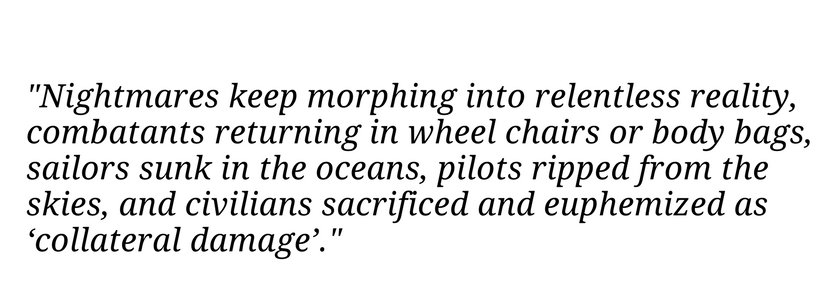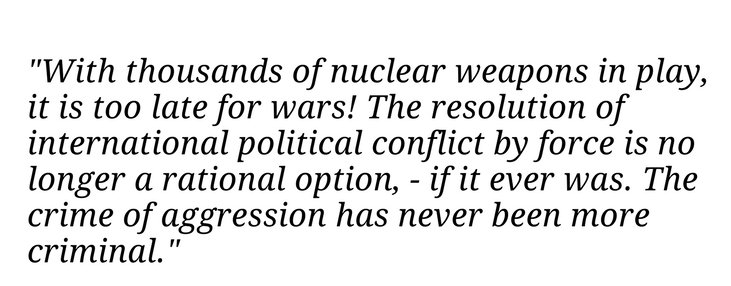A plea to reinforce peace
The long-awaited decision by the Assembly of States Parties to enable the International Criminal Court’s exercise of jurisdiction over the crime of aggression is urgently needed and cannot happen soon enough. As spelled out with more detail by article 8 bis of the Rome Statute, the crime is committed by a person in a position effectively to control or to direct the political or military action of a State and requires the planning, preparation, initiation or execution of a State act of aggression which, by its gravity, character and scale, amounts to a manifest violation of the Charter of the United Nations: The armed force of a State is unleashed upon another State with no justification in sight.
Not at all in the defense of a country, not at all in the defense of a people, but in the service of a crime that cries to heaven, soldiers are ordered to shoot and bomb a made-up ‘enemy’. Without good cause under the law of nations, they are misused as tools of the crime and turned into its cannon fodder. Heroism and comradeship are exploited for hypocrisy and the expansion of power. The victim State is trampled, its territorial integrity, sovereignty and political independence smashed into conceptual smithereens. Lives are ruined and families decimated. The human right to peace must not be recognized! Freedom is the freedom of the aggressor. Nightmares keep morphing into relentless reality, - combatants returning in wheel chairs or body bags, sailors sunk in the oceans, pilots ripped from the skies, and civilians sacrificed and euphemized as ‘collateral damage’. Instead of laughter from fields and gardens, last prayers from ditches and rubble. All ‘normal’ war, - no war crimes necessary! The degradation and slaughter of body and soul violate human dignity to its very core.
Heroism and comradeship are exploited for hypocrisy and the expansion of power. The victim State is trampled, its territorial integrity, sovereignty and political independence smashed into conceptual smithereens. Lives are ruined and families decimated. The human right to peace must not be recognized! Freedom is the freedom of the aggressor. Nightmares keep morphing into relentless reality, - combatants returning in wheel chairs or body bags, sailors sunk in the oceans, pilots ripped from the skies, and civilians sacrificed and euphemized as ‘collateral damage’. Instead of laughter from fields and gardens, last prayers from ditches and rubble. All ‘normal’ war, - no war crimes necessary! The degradation and slaughter of body and soul violate human dignity to its very core.
The urgency for activating the Court’s authority over the crime can scarcely be exaggerated. Everything possible must be done, and must be done now, to prevent crimes of aggression. First, the world is faced with catastrophic threats to its environmental, social and economic sustainability, requiring global cooperation to address them. Each armed conflict disrupts such cooperation. Second, we are sitting on the most horrific powder keg of all times. Since the dawn of the age of nuclear weapons, the numbers of civilian deaths argued to be proportionate to military objectives and thus acceptable ‘collateral damage’ have crept up into the unfathomable. We are talking crimes against humanity that make the devil blush. Most disastrously, starting a war risks the annihilation of all life on Earth. Nature and future generations, no more! With thousands of nuclear weapons in play, it is too late for wars! The resolution of international political conflict by force is no longer a rational option, - if it ever was. The crime of aggression has never been more criminal.

Relying on the nuclear weapons themselves to deter war is not a substitute for the activation of the Court’s authority over the crime of aggression. Quite the opposite. Nuclear deterrence, like other forms of deterrence, may very well steer State leaders away from crimes of aggression, yet it does so at horrendous and unacceptable risk. The threat of the use of nuclear weapons discourages, yet likewise provokes the use of armed force, including the use of the weapons themselves. Accident or miscalculation, irrationality or rationalization, recklessness or ruthlessness are all among the fuses for a cataclysm. For a safer barrier against crimes of aggression, - and against the use of nuclear weapons -, many building blocks of a fundamentally different kind have to be assembled and have to be assembled as rapidly as possible. From the moment it was born, the knowledge how to build nuclear weapons has signaled not only unprecedented danger but the dire necessity to think anew about ways to attain and maintain peace. Threats to meet attack with worse attack have truly reached a dead end.
While the activation of the International Criminal Court’s authority to prosecute crimes of aggression is not the only building block required for the maintenance of peace, it is crucial for backing up the United Nations Charter. Article 2 paragraph 4 of the Charter commands that “[a]ll Members shall refrain ... from the threat or use of force against the territorial integrity or political independence of any state, or in any other manner inconsistent with the Purposes of the United Nations.” (See also articles 1 and 51 of the Charter.) How long can the world afford to belittle this command by acting as if it does not exist, by treating it only as a second thought or by arguing it away? The norm has been firmly agreed upon after the Armageddon of World War II, consented to by all Member States of the United Nations and recognized as cogent. Members of the United Nations are, moreover, explicitly obligated to settle their international disputes by peaceful means in such a manner that international peace and security, and justice, are not endangered (article 2 paragraph 3).  How long can the world afford to dismiss peaceful approaches as futile? Are the claims of futility closely enough scrutinized? Did past efforts towards the peaceful resolution of a festering conflict maybe fail to come to fruition because they suffered from half-hearted diplomacy, from martial plotting in the background, or from unfulfilled promises on both sides? Were the rules, recommendations and options for the pacific settlement of disputes under Chapter VI of the United Nations Charter fully considered and followed? Has everything been tried? Really? How long must we fall for the selling points of State leaders bent on war? As long as room exists for peaceful approaches to forestall attack, a ‘war to prevent war’ is a war that maintains war. Reassurances of ‘containment’ will be at best delusional. Deemed ‘necessary’ by a corrupted conscience, war reigns supreme. The activation of the Court’s exercise of jurisdiction will say it again loud and clear: To weigh the use of force against another State is not a mere matter of political discretion, but the reckoning with a peremptory norm. In contrast, procrastination about the activating decision only keeps fueling addiction to the use of force and encourages those who seek to hollow out and disregard the norm. By tasking the Court with the prosecution of the crime of aggression, the States Parties to the Rome Statute will take a stand against criminal ruthlessness and reaffirm the United Nations Charter. The Court supports States in the fulfillment of their obligations under the Charter and helps to protect them not only from becoming victim States but also from being turned into aggressor States by their own leaders.
How long can the world afford to dismiss peaceful approaches as futile? Are the claims of futility closely enough scrutinized? Did past efforts towards the peaceful resolution of a festering conflict maybe fail to come to fruition because they suffered from half-hearted diplomacy, from martial plotting in the background, or from unfulfilled promises on both sides? Were the rules, recommendations and options for the pacific settlement of disputes under Chapter VI of the United Nations Charter fully considered and followed? Has everything been tried? Really? How long must we fall for the selling points of State leaders bent on war? As long as room exists for peaceful approaches to forestall attack, a ‘war to prevent war’ is a war that maintains war. Reassurances of ‘containment’ will be at best delusional. Deemed ‘necessary’ by a corrupted conscience, war reigns supreme. The activation of the Court’s exercise of jurisdiction will say it again loud and clear: To weigh the use of force against another State is not a mere matter of political discretion, but the reckoning with a peremptory norm. In contrast, procrastination about the activating decision only keeps fueling addiction to the use of force and encourages those who seek to hollow out and disregard the norm. By tasking the Court with the prosecution of the crime of aggression, the States Parties to the Rome Statute will take a stand against criminal ruthlessness and reaffirm the United Nations Charter. The Court supports States in the fulfillment of their obligations under the Charter and helps to protect them not only from becoming victim States but also from being turned into aggressor States by their own leaders.
A Plea to Reinforce Peace: Read the full article
Meet the author: Jutta F. Bertram-Nothnagel
Past Director of Relations with Intergovernmental Organizations for the Union Internationale des Avocats, continuing to serve as its Permanent Representative to the United Nations and to the International Criminal Court (ICC) Assembly of States Parties, Jutta F. Bertram-Nothnagel led the Coalition for the International Criminal Court (CICC) Team on the Crime of Aggression (2001-2010); attended the negotiating processes for the ICC since 1995; led the CICC Team on General Principles at the Rome Conference; has represented non-governmental organizations at the United Nations since 1992, especially in the areas of sustainable development and human rights.
